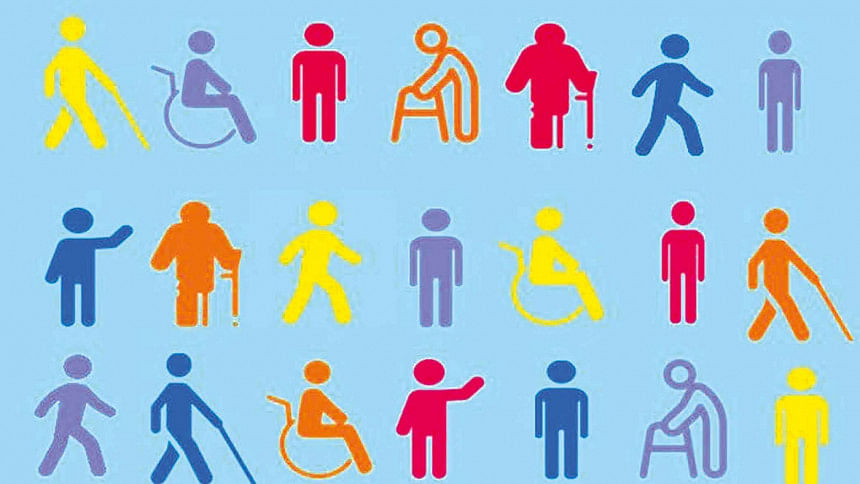On the rights of persons with disabilities

Preamble of the Constitution of Bangladesh declares that fundamental human rights, rule of law, social security, political, social, and economic rights will be secured for all the citizens of the country. Under article 15 of the Constitution, the right to social security, or to public help in times of legitimate need brought on by unemployment, illness, or disability, or experienced by widows, orphans, people in their late adulthood, or other similar circumstances, is particularly mentioned. By the turn of the 20th century, the United Nations has adopted the "Convention on the Rights of Persons with Disabilities (UNCRPD)" in response to the growing issue that disability was posing on a global scale as well as nationally. The government of Bangladesh ratified this convention in 2007 and pledged to implement its provisions by undertaking relevant state measures following the convention.With the enactment of the Rights and Protection of Persons with Disabilities Act 2013 (RPPDA), the government of Bangladesh took a step in the right direction toward protecting the interests of its citizens. The promptness of the government of Bangladesh has been shown while within two years the Rights and Protection of Persons with Disabilities Rules 2015 was published along with the official gazette. However, a decade later, a significant implementation gap is still apparent.
Under section 32 of the Rights and Protection of Persons with Disabilities Act 2013 accessibility of persons with disabilities (PWD) in public transport has been mentioned broadly. Article 9 of the UNCRPD emphasised on ensuring the rights of the PWD to participate independently in all aspect of life and enjoy access to all public infrastructure, transport, information, and communications. However, public transportations in Bangladesh barely put any effort into ensuring accessibility for all groups of people including those who need extra support. Public administrative buildings, police stations, courts, hospitals even educational infrastructures are rarely seen to have or built with wheelchair access with adequate ramps, and doorways. Section 34 of the RPPD Act of 2013 makes it a priority to ensure accessibility of people with disabilities to public infrastructure; however, the ambiguity and linguistic vagueness of the terminology is a hindrance to its implementation. In addition to that, Bangladesh's National Building Code of 2008 demands more essential provisions regarding the standard of building accessibility.
In terms of sexual and reproductive healthcare (SRH), people with disabilities face barriers in many ways including the social stigma. The lack of trained professionals in the health sector with adequate knowledge to treat persons with disabilities has proved to be a major issue in Bangladesh. Without adequate number of trained interpreters and professionals to treat persons with disabilities, the health care system cannot provide adequate service and often the persons with disabilities have to rely entirely on the family members. Under Article 25 of the UNCRPD, it was stated that the state parties of this convention shall recognise and respond appropriately to uphold the rights of persons with disabilities to the best possible standard of health without discrimination because of their condition.
Article 28(4) of the Constitution of Bangladesh empowers the government in making special provisions for people with disability. The UNCRPD also recognises that persons with disability should be accommodated equal protection and equal benefit of the law. Article 5 of the UNCRPD emphasises promoting equality and eliminating discrimination, it was also recommended that the government should take necessary measures to protect the interests of persons with disabilities. To prevent discrimination based on a disability, the RPPD Act 2013 emphasises on the protection and benefits of the law by enforcing criminal convictions. Section 36 of the Act states that a party who has been mistreated may bring a claim before the District Committee for damages; however, the provisions are ambiguous and did not specify the scope of discrimination.
Both men and women with disabilities face additional barriers in seeking legal protections and services. It is now a demand of time that the police officers, prison, and court officials undergo additional training on disability rights.
The only way to create a system that guarantees all individuals with disabilities have a flourishing livelihood in the community is through the enactment of clear and concise provisions with its proper implementation.
The writer is currently studying Postgraduate Diploma in Bar Vocational Studies at City, University of London.

 For all latest news, follow The Daily Star's Google News channel.
For all latest news, follow The Daily Star's Google News channel. 



Comments